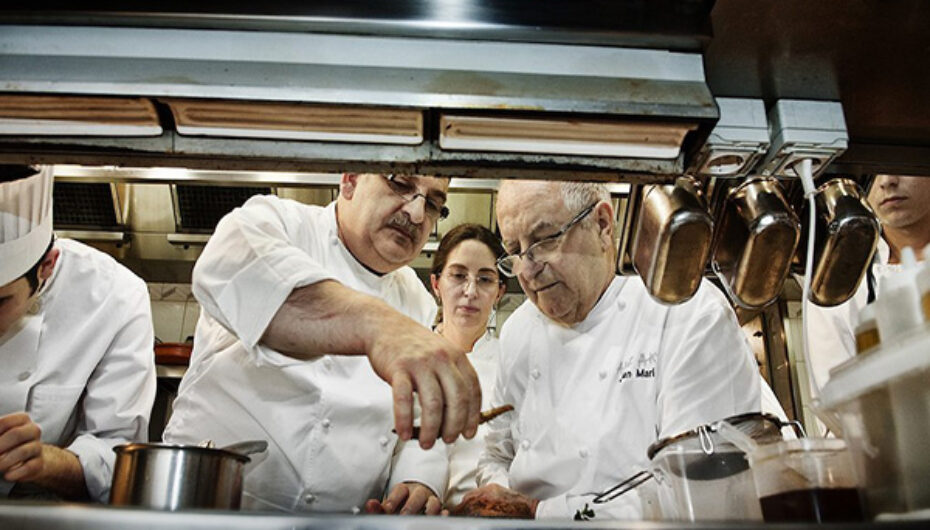
Gastronomy in Spain
The gastronomy of Spain is immensely rich and varied, just like the country itself. With a wide variety of top quality ingredients to choose from, old traditions and recipes combined to create new quality concepts and an incredible level in cooking skills – it is no surprise that Spain is at the top of culinary excellence in Europe.
History
The history of Spain’s beautiful cuisine has a lot to do with the country’s geographical location. Due to being located on the Iberian Peninsula, it is almost entirely surrounded by waters. Naturally, this advantageous location makes seafood one of the pillars of Spain’s gastronomy and is the cause of the country’s generally Mediterranean diet. The rest of Spain’s diverse terrain, which includes mountain ranges, lush pastures, extensive coastlines and fertile farmlands, together provide a variety of fresh products.
Over the years, Spain has always been influenced by different cultures passing through or settling. The Greeks introduced their wonderful olive oil, the Romans and Jews integrated elements of their own cooking…however, it was the Moors who have most impacted Spanish cuisine during their centuries of reign. They introduced fruits and light seasonings into the Iberian diet, as well as combinations of fruits and nuts with meats and fish. Rice – a genuine staple of Spanish gastronomy – and therefore Spain’s vast array of rice dishes, come straight from the Moors, as does the use of saffron, cinnamon, and nutmeg.
Most famous dishes
Tapas – Going out for tapas is probably Spain’s most famous gastronomic and social traditions. Widely thought to have been started in Seville, the way to enjoy tapas is to go to a bar with a group of friends and share a few different tapas with some wine or beer. Then, pick a new bar and more tapas and repeat the process. The tapas available will depend on what area of the country you are in, but some classics include calamares, croquetas, patatas bravas, anchovies, chorizo, tortilla española or jamón serrano.

Variety of Spanish tapas.
Paella – Rice is an absolute necessity in Spanish gastronomy, which has a lot to do with the little-known fact that Spain is the second largest producer of rice in Europe. The most famous Spanish rice dish is undoubtedly paella, of which there are many varieties. However, the people of Valencia (the famous paella city) will tell you that the two ‘true’ paellas are the paella valenciana (made with chicken and rabbit) and paella marinera (with many types of seafood).

Paella mixta
Tortilla – You cannot come to Spain without trying the famous tortilla Española or Spanish omelette. A simple yet vital part of Spanish gastronomy; it can be served hot or cold, as a meal or a tapa, on its own or in a sandwich. Although the tortilla española is usually kept to the basics of potatoes and eggs, sometimes you can find other vegetables – onion often makes an appearance- thrown into the mix for variety.

Tortilla española
Where to try Spanish cuisine
Food Markets – Spain is world-famous for its array of gastronomic markets across the country where you will find the highest quality and freshes products. Some of the most noteworthy gastronomic markets include – Mercado de San Miguel (Madrid), Mercado de San Anton (Madrid), La Boqueria (Barcelona), Mercat Central (Valencia) and Mercado Victoria (Córdoba).

Mercado de San Miguel in Madrid
Michelin Star Restaurants – Spain is not short of world class Michelin star restaurants, and in 2019 alone received 30 more Michelin stars across the country. Go the Basque city of San Sebastián and you will find some of the best restaurants in Spain, such as Martin Berasategui, Akelarre and Arzak. Other Michelin star restaurants across the country include Yugo and DiverXO (Madrid), ABaC and Lasarte (Barcelona) and Dani García (Marbella).

Arzak restaurant, San Sebastián

 Cádiz: A Gateway to the superb Andalusian city & region in the south of Spain
Cádiz: A Gateway to the superb Andalusian city & region in the south of Spain
 SIMOF 2024 * More Than Fashion… An Experience!
SIMOF 2024 * More Than Fashion… An Experience!
 ‘TABLAO’ with Grammy© Award-winning Cantaor ARCANGEL
‘TABLAO’ with Grammy© Award-winning Cantaor ARCANGEL
 Xª Festival ‘Cumbre Flamenca’ * June 7, 2019 * Broad Stage, Santa Monica / Thank You So. California!
Xª Festival ‘Cumbre Flamenca’ * June 7, 2019 * Broad Stage, Santa Monica / Thank You So. California!



